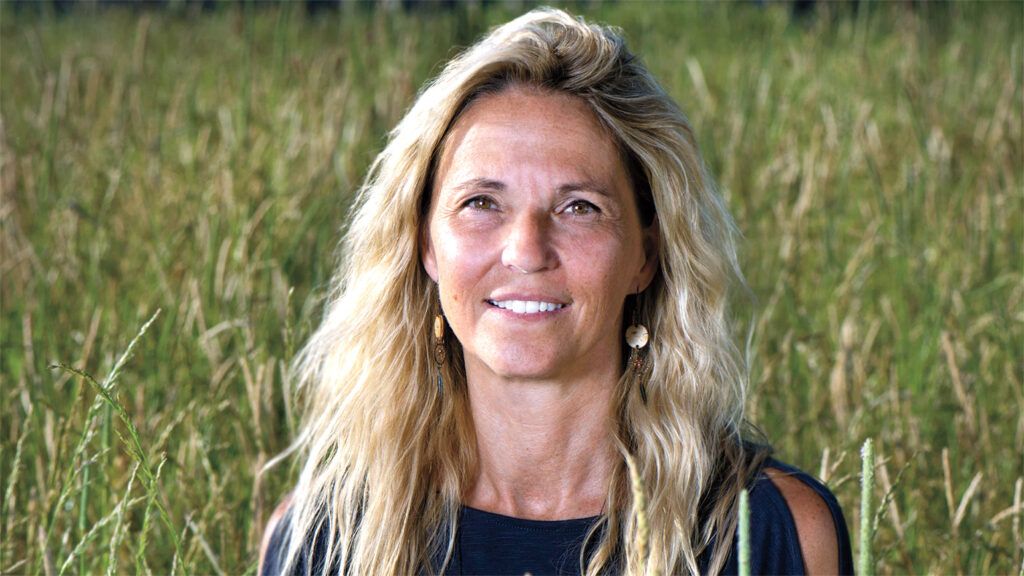Everyone stresses out sometimes. A few years ago, my stress became intolerable. I realized I needed a spiritual solution for a problem I could no longer manage on my own.
I’ve always been a high-stress person. I was sexually abused as a child, and that trauma affected my whole life. My fears take the form of a type A personality. I plan. I’m hypervigilant. I want everything safe, under control.
Imagine how I felt when a mass shooting occurred at my kids’ school in 2012. My kids survived, but it was as if all my worst fears had come true. I doubled down on my protective instincts. Worried about absolutely everything.
Somehow I managed until four years ago. By then, all three of our kids were out of the house. My oldest son, Johnny, had graduated from college. His younger brother, Kyle, was a senior at Ohio University.
It was my daughter, Kahrin, who put me over the edge. She was in college and planned to spend part of her summer on a mission trip to Ecuador, followed by a six-week study-abroad program in Spain.
The thought of Kahrin jetting off by herself filled me with worry and anxiety. I kept envisioning worst-case scenarios. Often, when I talked to Kahrin and her brothers, I nitpicked their plans and made them promise over and over they’d stay safe.
Finally all three kids called me on it. “Mom, your fear is making us worried,” they said. “We need to keep living our lives.”
They were right. My fear-based thinking was holding them back. And me. I even developed a mysterious allergy to dairy products. We traveled to Spain to visit Kahrin, and I felt sick every time I ate gelato.
When we got home, I knew I had to do something. Trying to pray away my worries wasn’t working. It was only adding more stress because I blamed myself for not having enough faith.
One day, while praying, I remembered a line from Matthew 5:7, The Message translation, one of my favorites. It says: “You’re blessed when you get your inside world—your mind and heart—put right. Then you can see God in the outside world.”
Your inside world. That’s where my problem was. I did a deep dive into understanding my emotions, the mind-body connection and the science behind how stress affects health. Science backs up what Jesus says. Your mind and heart have a huge effect on your mental, emotional, spiritual and even physical well-being.
One study I read really jumped out at me. Researchers in 1995 found that just five minutes of anger suppresses one of the body’s primary immune responses for up to five hours. My constant state of stress was taking a huge toll on my body.
I needed to act. I did more research and developed a plan that changed my life. Here are a few things I learned. I hope they help you too.
1. Start with self-awareness
Paul’s second letter to the Corinthians instructs us to “take captive every thought to make it obedient to Christ.” Great advice. But how can we do that when we have thousands of thoughts a day and a huge percentage of them are negative?
My mind was a mess of fears, worries, plans, regrets. Our bodies respond to stress the same way whether the threat is real or imagined. I had to make some changes.
I began waking up early to meditate, what Christians call contemplative prayer. I sat silently in God’s presence and simply observed my thoughts and emotions without judgment. I became aware of being aware.
Gradually I developed the ability to question each stressful thought as it came: “Is the story I’m telling leading me toward or away from inner peace? Is it even true? Does it help me love and serve others?”
Jesus promises us peace “greater than the human mind can understand.” Every stressful thought I clung to was leading me away from that.
I let go of those thoughts. Literally loosened my grip and surrendered them to Christ. To remind me to keep up the habit, I made the verse from Corinthians the screen background on my phone.
2. Become like a child
Jesus tells us in Matthew, “Unless you change and become like little children, you will never enter the kingdom of heaven.”
Children live in the present and appreciate the beauty and wonder of God’s creation. They are trusting, loving and nonjudgmental.
I was too often caught in the trap of past regrets and future worries. To help me become more childlike, I chose to do things that I knew would keep me living in the moment, enjoying what I already had instead of fearing what might happen.
I started playing cards and doing puzzles with my kids when they visited. I taught myself to play the piano. I took more walks and hikes, paying attention to the details of beautiful trees and flowers and taking photos.
My perspective shifted. Before, I had been focused on potential risk and danger. Now I was more in tune with the beauty all around me.
Keeping my focus on the here and now helps me feel that God is close. As close to me as this present moment. Fear gives way to love in the presence of God.
3. Breathe
The biblical creation story says that God brought humans into being by breathing life into us. Our breath is a physical embodiment of our soul.
When I’m stressed, my breath becomes rapid and shallow. It’s a fight-or-flight response that takes a huge toll on my mental and physical health. To calm down, I needed to change how I breathe.
Skeptical? Try this experiment. Take a series of short, rapid breaths. Do you feel calm, at peace? Now do the opposite. Count to four slowly as you breathe in. Pause for four beats without exhaling or inhaling. Count to four as you exhale. Pause for another four. Do that 10 times. How do you feel now? More relaxed, right?
Do you feel a stress attack coming on? Try a few minutes of slow breathing. Breath work also helps calm you for prayer.
It’s a lot easier to talk to God—and hear what he says—when your mind isn’t anxious and noisy.
4. Create a “to-be” list
In Matthew, Jesus says, “First wash the inside of the cup and the dish, and then the outside will become clean too.” Getting your mind and heart in order is what enables you to effect change in the outside world.
When I was stressed, my whole focus turned outward. I feared the worst and tried to prevent danger by controlling the world around me. Being a control freak felt like a source of power. Really, I was letting my fears control me.
One of the most common sentences in Scripture is “Do not be afraid.” A peaceful heart is unafraid because it trusts God to be there, no matter what.
I discovered that a good way to cultivate peace in my heart was to create a “to-be” list. Alongside my to-do list, I made a list of inner qualities I wanted to improve, such as love, kindness, patience, gratitude.
I now measure the success of my day not by the number of tasks I complete but by how I do them. Whatever I do, I look for ways to be kind and loving. I try to be joyful and patient. I am grateful for my blessings.
You would think easing up on my inner taskmaster would make me feel less effective.
It’s the opposite. I make progress on my goals every day. I am slowly becoming someone who trusts God enough to give him my fears so I can focus on loving myself and others well. I am becoming someone new.
I still get stressed. I still worry about my kids. I’ll never completely forget the trauma of my childhood.
But I am nothing like the scared mom who nearly had a breakdown as her adult daughter traveled abroad.
I’m calmer. More loving. More patient. More grateful.
Oh, and that dairy allergy? Gone.
For more inspiring stories, subscribe to Guideposts magazine.






